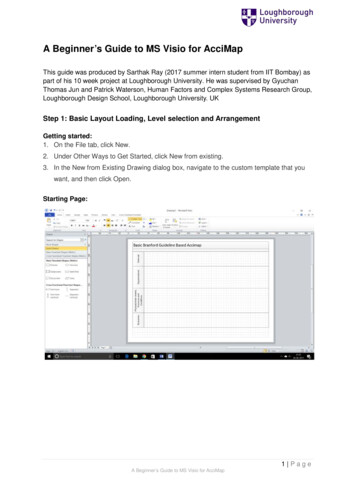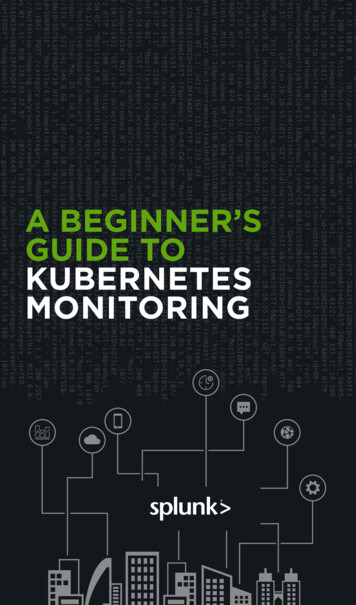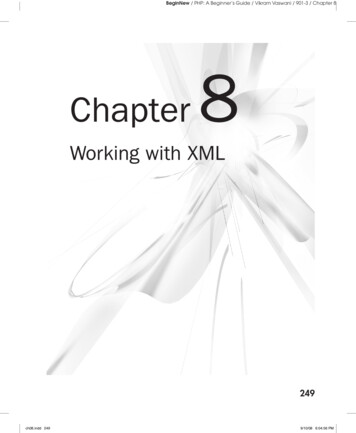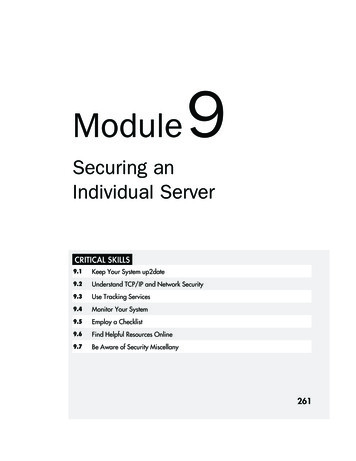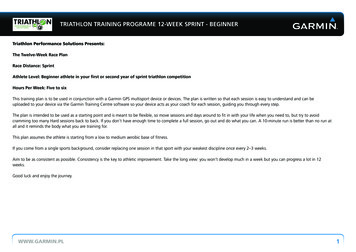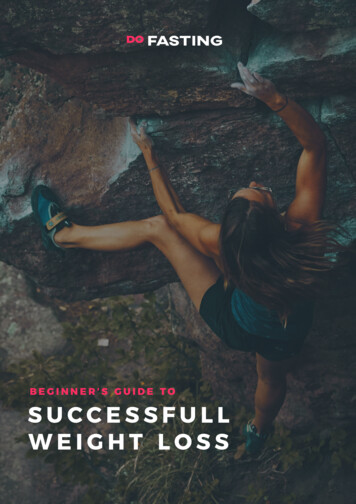
Transcription
BEGINNER’S GUIDE TOSUCCESSFULLWEIGHT LOSS
TA B L E O F C O N T E N T S4456-7899101011111214141515The History of FastingWhat Is Modern Fasting?The Basics of Intermittent FastingFASTING BENEFITSDIFFERENT METHODS OF FASTINGThe 5:2 Fast: Two Days Per WeekRandom Meal SkippingFasting on Alternate Days12-Hour Fasts16-Hour Fasts20-Hour Fasts: “The Warrior Diet”24-Hour FastsUSEFUL TIPS TO HELP YOU SUCCEEDStaying HydratedCutting Down on SnacksWays to Beat Food CravingsCalculating Your Calorie IntakeExercising During Intermittent Fasting16-17GETTING STARTED18-19FAQS202INTRODUCTIONDoFasting: Beginner’s guideWHY CHOOSE DOFASTING?3
INTRODUCTIONIn recent years, everything has changed.Today, we have access to unlimited amountsof food and our bodies find it difficult tohandle the load. That’s where the need forIntermittent Fasting comes from. It’s onlywhen we are not eating or drinking anythingwith calories in it that our bodies can beginthe process of repair and create space fornew cells to grow.Intermittent Fasting doesn’t prohibit peoplefrom eating, but encourages them to eat onlythe food we need, when we need it, so wedon’t eat more than our bodies are capableof processing.THE HISTORY OF FASTINGBefore the modern era, eating patterns wereirregular because of war, insect infestations,diseases, and other interruptions. Access tofood was restricted, and sometimes peoplestarved – for both short and long periodsof time. During summer and fall, people hadaccess to plenty of fruits and vegetables, butin winter and spring these foods were scarce.Periods without regular access to food lastedlonger than you might expect, from weeks toeven months. These hard times may explain4Take a good look at human history and you will find that fasting isdeeply rooted in our biology. Back in the day, access to food was limited,which led to natural periods of fasting and changes in human evolution.The human body, including the brain, became accustomed to regularfood scarcity.Today, you have the freedom to choosefrom many different methods of fasting.Fasts can last from 12 hours to 24 hours.You can choose to fast once a week, oncea month, or even once a year. You can doshorter fasts daily, or longer ones (24-36hours) two or three times per week. Thereis no single best way for everybody – it isalways a personal preference.day, while we are sleeping. IntermittentFasting can be as simple as extending thatfast for a few hours longer.WHAT IS MODERN FASTING?What’s the difference between fasting andstarvation? Well, for starters, people whoare starving are not doing it voluntarily. Theysimply cannot tell when they will eat next. Itcan happen during war and famine, whenfood is scarce. However, those who chooseto fast are fully in control of their eatingpatterns.Here’s one example: Skip your breakfastand have your first meal at noon. Then haveyour last meal at 8 p.m. That’s it! You’ll havefasted about 16 hours in a day, which wouldbe the 16/8 method – eating for 8 hoursand fasting for 16 hours. That’s one of themost popular methods of fasting.Mankind has a long history of fasting, butthe aspects of how and why we do it havedrastically changed.Fasting is a voluntary abstention from eatingfor health, weight loss, or other reasons. Itcan be simple, practical, and very effective.Modern Intermittent Fasting consists ofperiods of fasting that occur regularlybetween periods of eating. You are still ableto eat a normal amount of food, but yousimply do it in a smaller time frame, whichis called your ‘eating window.’THE BASICS OF INTERMITTENTFASTINGwhy one of the Four Horsemen ofthe Apocalypse is named Famine.Fasting is the most time-honored healingtradition in the world. It’s a part of everyculture and religion on Earth. People fromcivilizations like Egypt or Ancient Greecewould introduce periods of voluntary fastinginto their personal lives. They observed thatfasting had many health benefits, whichis why they engaged in the practice evenwhen the periods of involuntary starvationhad ended. They called it “cleansing,”“purification,” and “detoxification.” If you thinkabout it now, these civilizations were muchmore advanced than we credit them for.Intermittent Fasting is an eating patternwhere you cycle between periods of eatingand fasting. Most of us already “fast” everyDoFasting: Beginner’s guideHowever, if you’re thinking about fastingas a long-term lifestyle change, you canchoose from a number of IntermittentFasting methods that are easy to implementinto your daily routine.Generally speaking, women should fast forabout 13 to 14 hours a day. Men should fastup to 16 hours a day.One of the most important aspects ofIntermittent Fasting is timing. In order toadjust the release of hormones in your body,it’s better to fast around the same time eachday. This way, you will be able to ease yourbody into this new eating pattern and, ofcourse, stick to the plan for the long term.5
FASTING BENEFITS1SLOWS DOWN THE AGING PROCESSAging is a process that can’t be stopped,but changing the way we treat our bodiesdramatically affects the way we age.According to research, dietary restrictionssuch as Intermittent Fasting can keepour mitochondrial networks in a “youthfulstate.” This means that the fasting processactivates the life-extending mechanisms,creates space for new cells to grow, andliterally rejuvenates our bodies.2BENEFITS YOUR SKINIntermittent Fasting has helped numerouspeople who suffered from skin-relatedproblems, such as acne. The secret is,when you give your body an extendedbreak from its digestion routine, it kickstarts your body’s detox mechanism too.Those who allow their body to adjustto this new digestion pattern claim toenjoy clear, glowing, healthy skin – anunexpected, long-lasting perk that comeswith Intermittent Fasting.6345SIMPLIFIES YOUR LIFEWhen you eliminate the number of meals youeat in a day or week, you also find this amazingadded benefit: meal preparation becomesmuch easier. During eating windows, you cansimply eat your regular food and then drinkwater, tea, coffee, or bone broth while fasting.Easy!SAVES MONEYWith other diets, you usually need to replaceyour daily food with expensive alternativesor fancy ingredients that are difficult to find.Fasting does not require replacing food. Youare simply eliminating some of what you eat,and not replacing anything if you don’t want to.IMPROVES RESISTANCE TO OXIDATIVESTRESSIntermittent Fasting may improve ourresistance to oxidative stress, a process thateventually leads to the destruction of importantmolecules in the body through reactionswith other unstable molecules, such as freeradicals.One of the most noticeable and commonly desired benefits of fasting isweight loss. Before the modern era, people fasted to cleanse their bodiesof toxins and treat certain diseases. Today, we know that fasting has evenmore reported and demonstrated benefits.678REDUCES INFLAMMATIONFasting controls the release of free radicalspresent in your body and protects you frominflammation. Fasting for prolonged periods,coupled with ample water consumption, canhelp you eliminate inflammation issues entirely.IMPROVES YOUR BRAIN HEALTHFasting improves metabolic factors that areimportant to our brain health. This includesless oxidative stress and inflammation, aswell as a drop in blood sugar levels andinsulin resistance. Eventually, it also increasesthe levels of brain-driven neurotrophicfactors – a brain hormone that, whendeficient, is directly linked to depressionand other mental health issues.hormone levels to facilitate weight loss.By lowering insulin and increasing growthhormone levels, it also increases therelease of the fat-burning hormone callednorepinephrine (noradrenaline). Due tothese hormonal changes, fasting increasesyour metabolic rate.Studies show that people who practiceIntermittent Fasting can expect to lose upto 7% of their waist circumference, whichindicates a significant loss of harmful bellyfat that builds up around internal organs andcauses disease.What is more, fasting can reduce insulinresistance, lowering blood sugar by 3-6%and insulin levels by 20-31%. It reduces“bad” LDL cholesterol, blood triglycerides,inflammatory markers, and blood sugar.HELPS TO LOSE WEIGHTThis might be an obvious benefit, but it’simportant to know about some of the lessobvious reasons behind weight loss.Intermittent Fasting increases “lipolysis”(fat burning) in the body and changesDoFasting: Beginner’s guide7
DIFFERENTMETHODSOF FASTINGTHE 5:2 FAST:2 DAYS PER WEEK8When it comes to fasting, thereis no single method that fitsall. The most important thing isfinding a program that fits yourlifestyle, health, and goals – aprogram that you can actuallystick to in the long run.The 5:2 fasting method allows you to eatnormally for five days and then restrict yourcalorie intake to 500-600 calories on theother two days. This fasting method is highlyflexible; you can choose whichever two daysyou prefer. However, we highly recommendincluding at least one non-fasting day inbetween those two days.In this chapter, we will introduceyou to some of the most popularforms of fasting in detail.The 500-600 calories can be eitherconsumed in a single meal or spread out intomultiple meals over the course of the day.Women who eat two meals a day shouldbreak it down to 250 calories per meal, andmen should raise this number to 300 calories.RANDOMMEAL SKIPPINGRandom meal skipping is mainly focused oneating unprocessed foods. Other than that,the rules of fasting are highly flexible andyou can skip meals randomly once or twicea week. This type of fasting is perfect forpeople who are busy and don’t have a lot oftime to follow different diets.DoFasting: Beginner’s guideFASTING ONALTERNATE DAYSAs the title suggests, this plan allows youto eat every second day. For example, onMonday you would eat anytime between7-8 a.m. and 7-8 p.m., then you wouldfast on Monday night and all day and allnight on Tuesday. You would start eatingagain from Wednesday at 7-8 a.m. andcontinue in that same order. Those whofollow this method should choose healthyfood on fasting days and eat whateverthey wish on non-fasting days.9
12-HOUR FASTSA 12-hour fast means that you eatwithin the first 12 hours of the day andabstain from food for the next 12 hours.For example, if you eat three mealsa day from 8 a.m. to 8 p.m., then youshould fast from 8 p.m. to 8 a.m. Thismethod is easy to follow and providesamazing results in the long run.1016-HOUR FASTS16-hour fasts are a bit more complex than12-hour fasts, but in return they lead to evenbetter results. As the title implies, you shouldhold off from any food for 16 hours and eatduring the remaining 8 hours of the day. Whenfollowing this method of fasting, you have toconsume lots of high-protein foods and eatcarbohydrates on rotation. If you also exercise,you should try to be strategic with yournutrient intake. This means that the majorityof your carbohydrates should be consumedimmediately after a workout.For example, if youeat from 11 a.m. to 7 p.m., then during thatperiod you should eat two to four or five mealsand fast from 7 p.m. to 11 a.m. When followingthis method of fasting, some people chooseto skip the morning meal every day and havesnacks before other meals instead.20-HOUR FASTS:“THE WARRIOR DIET”A 20-hour fast is considered to be one ofthe oldest methods of fasting. It allows youto eat small portions of certain food types atdinner. During that dinner period, you shouldalso work out. At the end of the day, youwould have a feeding window. This fastingmethod is very convenient and providesamazing results.DoFasting: Beginner’s guide24-HOUR FASTSA 24-hour fast means that you fast frombreakfast to breakfast, from lunch to lunch, orfrom dinner to dinner – whichever you prefer.For example, if you have dinner at 7 p.m. onDay 1, you should fast until 7 p.m. on Day 2.Regardless of what the title suggests, youdon’t have to fast for 24 hours. You can haveone meal during that time to tide you overand use it to take medications that must betaken with food.11
USEFUL TIPSTO HELP YOUSUCCEEDDon’t forget to drink water during a fast! It is not enough to drink eightglasses of water a day. If you drink coffee while fasting, you also needto drink an additional 250ml of water, because coffee is a diuretic thatincreases dehydration. To improve fluid absorption and keep yourelectrolytes in balance, you can add a bit of sea salt into your drinkingwater. If you don’t follow these guidelines, dehydration could lead topainful muscle cramps, decreased physical performance, and evenexhaustion.TEAWATERTwo liters of water a day should keep you wellhydrated. You can start with eight ounces ofwater every morning, which would provideyou with adequate hydration necessary tostart the day.Eating or drinking anything that hascalories will raise your insulin levels.Dietary carbs will raise your insulin levelsmore than dietary protein, while dietaryfat does not impact your insulin levels.If you don’t like drinking plain water, you canadd lemon, orange, berries, or cucumberslices. You can also add 5ml (a teaspoon) ofdiluted apple-cider vinegar to 300ml of water.This will help to lower your blood sugar levels.Adding sweeteners, artificial flavors, Kool-Aid,Crystal Light, or Tang is not recommended.We all know that food is a mixture ofmacronutrients, so you will certainlyraise your insulin levels if you eat or drinkcalories. Why is raising insulin levelsin your blood a bad thing when you’refasting? Because it stops your body fromusing fat as a source of fuel. When yourinsulin levels are high, your body is in afat-storing mode and you are not ableto release fat from your fat stores. Thekey point of Intermittent Fasting is that itpromotes the release of body fat for fuel.Also, try to avoid sparkling drinks. You candrink a maximum of just 300ml a day, butsparkling drinks may make you feel hungry,and the CO2 in sparkling drinks will irritateyour stomach mucosa.12PROTEIN SHAKESTea is a perfect choice while fasting. You canchoose green, black, oolong, or herbal tea.The benefits of drinking green tea:The catechins in green tea are believed tohelp with suppressing appetite.Herbal teas are not considered as real teas,because they do not contain tea leaves.However, they are great for fasting.Cinnamon and ginger tea is known forits appetite-suppressing powers.Mint and chamomile tea is often usedfor its soothing properties.Note that black and green tea containsvarying levels of caffeine, so it’srecommended to drink them in the morning. Ifyou’d like a cup of tea in the evening, alwaysgo for herbal teas that don’t contain caffeine.It’s okay to add a small amount of creamor milk to your tea, but don’t use sugar orartificial sweeteners. If you notice that yourprogress is slowing down, you can alwayseliminate more calories by going back to aclassic water-only fast.DoFasting: Beginner’s guideCOFFEEIt’s okay to drink caffeinated or decaffeinatedcoffee during a fast. If you want, you caneven add a small amount of coconut oilor cream (1 to 2 teaspoons). While somemight call it cheating, we believe that thedifference is too small to change the overalloutcome of following a fasting program.After all, these minor flexibilities make iteasier to stick to the program in the long run.To add more flavor to your coffee, you canuse cinnamon, nutmeg, or other naturalspices. Sweeteners, sugar, or artificialflavorings are not allowed. On hot days,you can substitute hot drinks with a cup ofrefreshing, delicious cold brew coffee.Remember, when taken in moderation,coffee can even benefit your health. It makesa great source of antioxidants and reducesthe risk of Type 2 diabetes.13
CUTTING DOWNON SNACKSSnacking is usually done more out ofhabit than due to an urgent need. Threelarge meals should be enough to keepyou energized and full throughout theday. When your body starts adjustingitself to longer periods of fasting, yournatural insulin levels, as well as thehormone cycle, start to function properly.However, fasting should not meansuffering. If you struggle to say no tosnacking, the best alternative would beto divide your daily meals into a few minimeals, or choose snacks that are highin fiber and protein as these will help tokeep you feeling full and satisfied.WAYS TO BEATFOOD CRAVINGSOne of the best perks of this type offasting is that you are allowed to drinkmost, if not all, of your favorite drinks. Tobeat food cravings, make sure that youdrink lots of water, tea, coffee, or broth.All of these drinks work great as mildappetite suppressants.Staying busy is another great way to takeyour attention away from food. Whenthe hunger hits, slowly drink a cup of hotcoffee or a glass of water. This temporarysolution will keep you feeling full and helpto distinguish actual hunger from cravings.If you prefer, you can go for vegetable broth,but note that bone broth contains morenutrients. It is not recommended to eatcanned broths or add bouillon cubes thatare full of artificial flavors and monosodiumglutamate. It’s always better to add your own14Follow these guidelines to calculatehow many calories every meal shouldcontain:If you have five meals per day:25% calories for breakfast, 10% caloriesfor snacking, 30% calories for lunch, 10%calories for snacking, and 25% caloriesfor dinner in accordance with your dailycalorie intake.If you have four meals per day:25% calories for breakfast, 40% caloriesfor lunch, 10% calories for snacking, and25% calories for dinner in accordance withyour daily calorie intake.If you have three meals per day:25% calories for breakfast, 40% caloriesfor lunch, and 35% calories for dinner inaccordance with your calorie intake.BONE BROTHTo reduce your hunger pangs, you canalways use this easy and healthy alternative:homemade bone broth. It contains numerousminerals and vitamins and is quite ‘filling.’Broth can be made from pork, beef, chicken,or even fish bones.CALCULATING YOURCALORIE INTAKEvegetables, herbs, and spices. During longerfasts, you may experience a salt deficiencywhich can lead to dehydration. Since it’snot present in water, tea, or coffee, you canadd a pinch of salt to your homemade bonebroth. Salt has minerals, such as potassiumand magnesium, which can be particularlybeneficial during fasting.Bone broth helps to diminish hunger pangs,is known for its anti-inflammatory effects,and carries its own benefits for bone andjoint health.FASTING IS THEMOST TIME-HONOREDHEALING TRADITIONIN THE WORLD.IT’S A PART OFEVERY CULTURE ANDRELIGION ON EARTH.DoFasting: Beginner’s guideEXERCISING DURINGINTERMITTENT FASTINGCan You Exercise During IntermittentFasting?Yes, you are free to exercise during fasting,but it’s very important to pay attention tothe macronutrients consumed before andafter exercise. Strength workouts requiremore carbohydrates, while cardio orhigh-intensity interval training requiresfewer carbohydrates.The best option for exercising while followingthe Intermittent Fasting plan is during youreating periods, when your nutrition levels arepeaked. Also, after strength workouts, it’simportant to give your body protein to aidregeneration.Choosing the internity of exerciseThere may be some differences in whattype of exercises you should choosedepending on your chosen IntermittentFasting method. For example, if you’refollowing the 24-hour plan, you shouldstick to low-intensity workouts such aswalking, restorative yoga, or gentle Pilates.If you’re following the 16:8 fast, much ofthe 16-hour fasting window will turn out tobe in the evening, sleep time, and early inthe day, so there’s practically no need tostick to a certain type of exercise.Training after a 12- to 24-hour fast istheoretically called “training in the fastedstate.” This simply means exercising afterhaving not eaten for several hours. At thispoint, your blood sugar and liver glycogenlevels are compromised, so you’re morelikely to burn body fat as fuel.15
G E T T I N G S TA R T E DDOCTOR’S APPROVALTHE TRUTH IS THATPEOPLE WHO STARTTHIS DIET GENERALLYFEEL FULLER.For some, just the idea of going without foodfor more than a few hours seems impossible,and that’s absolutely understandable. Theymight be used to certain eating patterns dueto their acute health issues or chaotic workschedules.THEY FEEL MORE ATPEACE, MENTALLYSTABLE, AND END UPWEIGHING LESS.Also, you might be frightened by the thoughtof hunger, stomach pains, irritability, or moodswings that you think you’d experiencewhen following a fasting diet. But the truthis that people who start this diet generallyfeel fuller. They feel more at peace, mentallystable, and end up weighing less – all ofwhich leads to better health and a morepositive outlook on life.Unless you are suffering from a seriousmedical condition that requires you to eat asoften as possible, there’s little reason whyyou shouldn’t follow this diet.16No matter your age, you should be ableto follow an Intermittent Fasting plan.However, it’s always advised to consultwith your doctor before doing so.Someone who is familiar with yourrecent physical and mental healthhistory will be more able to advise youon whether this plan is right for youTAKE IT EASYIt takes time to get used to fasting.At first it can seem extremely difficult,but the good news is that fastinggets easier each day. It’s okay to giveyourself an adjustment period, whichcould last as much as one month.DoFasting: Beginner’s guideDON’T FORGET TO TAKE CARE OFYOURSELF AND STAY HEALTHYGo to sleep on time, start your day early, andexercise when possible. Getting into thesehealthy habits will help you to beat hungerand stay well rested, balanced, and happy.Also, it’s very important to follow a nutritiousdiet, even on non-fasting days. Don’t usecheat days as an excuse to eat whatever youwant. Remember, Intermittent Fasting is notjust a weight loss program – it’s a lifestyle.FEEL FREE TO EXPLORE NEW FOODSNeedless to say, you shouldn’t stop eatingor start hating food altogether. You can,and should, feel free to explore new foods,cuisines, recipes, and eat well when it’s timeto eat. Just don’t eat during a fasting period,and eat healthily during the eating period.It’s that simple!17
FAQ1. CAN ANYONE FOLLOW THEINTERMITTENT FASTING PLAN?Based on numerous studies and benefits,Intermittent Fasting is really suitable foranyone who wants to enjoy improved healthand lose weight. In fact, Intermittent Fastingdoes not require any specific changes toyour diet to obtain these benefits, whichmakes it acceptable for almost every adult.2. IS IT NORMAL THAT I FEELHUNGRY DURING FASTING?It’s totally normal to feel hungry whilefasting. You’re not consuming any food, sonaturally your stomach might experiencethe odd growl.Plus, we all have the hunger hormone,ghrelin, which is produced byghrelinergic cells in the gastrointestinaltract. It responds to a lack of food in ourstomach and transmits the signal to ourbrain, making us think that we are hungry.Hunger pangs usually disappear after yourfirst 2-3 fasts as your body adjusts.3. CAN I HAVE A SNACK BETWEENMY MAIN MEALS?You can eat two, three, or even five mealsper day; you are not limited to a specificnumber. Have in mind that you are fastingafter your meals, not between them.18The important thing is that you do notexceed your daily calorie intake and thatyou stick to the recommended portion sizes.Also, don’t forget that by reducing yourcalorie intake, Intermittent Fasting shouldcause weight loss, as long as you don’tcompensate by consuming more caloriesduring the eating periods.4. WHY DO I FEEL COLD DURINGFASTING?During fasting, some people discover thattheir fingers and toes become really cold.When you fast, more blood travels to yourbody fat, supposedly to help move it to yourmuscles where it can be burned as fuel.Because of this increased blood flow toyour body fat, your vessels in your fingertipsand toes constrict to compensate.5. IS IT NORMAL THAT I GETHEADACHES DURING FASTING?Not everyone experiences headacheswhile fasting; it highly depends upon theindividual. According to research, it seemsthat women are particularly susceptibleto headaches while fasting. If you areexperiencing headaches, don’t be tooalarmed. They tend to go away afteryour first couple of fasts. If needed, youcan treat your headache by taking somesupplements. Also, keep in mind that youneed to drink lots of water during your fasts.6. IS IT NECESSARY TO FAST EVERYDAY?If you can’t fast every day, it doesn’t meanyou shouldn’t do it at all. The more youcan do, the better results you will achieve.Despite how it may look, Intermittent Fastingplans are fairly easy to follow. Many peoplereport feeling better and having more energyeven during a fasting time.7. IS IT NECESSARY TO ALWAYS SKIPBREAKFAST?9. CAN WOMEN FOLLOWINTERMITTENT FASTINGDURING PREGNANCY OR WHILEBREASTFEEDING?It is not advised to start Intermittent Fastingduring pregnancy or when breastfeeding,especially if you are interested in long-termfasts. It is important to eat a variety of foodsthroughout the day, ensuring you get all thenutrients your body needs.Studies suggest that skipping breakfast isthe most effective method, but everyone isdifferent. If you enjoy having breakfast, keepeating it! Intermittent Fasting allows you toset your fasting schedule as you wish. Forexample, if you have breakfast at 8 a.m.,make sure to have your last meal at 4 p.m.(if you follow a 16-hour fast). Just make sureyou leave enough time between eating foryour body to enter the fasting state.8. WHY AM I HAVING A HARD TIMEFALLING ASLEEP?It’s important to note that fasting boosts yourenergy levels, which can cause some issueswith falling asleep. If you encounter thisproblem, limit your caffeine consumption tothe morning and early afternoon hours only.DoFasting: Beginner’s guideWHERE DIETSCAN COMPLICATELIFE, FASTINGMAY SIMPLIFY IT.19
WHY CHOOSEDOFASTING?Before you start fasting, it’s importantto define your goals, needs, and dietarypreferences; not just to ensure that it issuitable and safe for you, but to make surethat you will stay motivated and focusedon what you are hoping to achieve.With DoFasting, we customize yourplan. It’s tailored to fit your lifestyle andpersonal preferences, which makes it aplan that is easy to follow in the long term.The first week or two are likely to be thetoughest, as your body adapts to fewercalories. During that time, you are alsoforming new habits: getting used to eatingand even preparing food in a different way.DoFasting will help you to adapt to thisnew lifestyle. It gives you a personalfasting schedule, motivational tips, and anutrition guide that includes lots of usefulrecipes for healthy daily nutrition.20WITH DOFASTING,YOU CAN EXPECT TO:Increase your energy levels in just one week;Improve your current metabolism level;Increase your consumption of water;Reduce risk for disease;YOUR JOURNEYTO WELLNESSS TA R T S H E R E !Learn how to free yourself from foodcravings in just a few days;And finally - achieve your goal weight.Fasting is one of the most powerfulthings you can do. Set yourself upfor a healthier future with DoFastingDOFASTING.COM
To contact the author please sendan email to hello@dofasting.comCOPYRIGHT 2019 BYAll rights reserved. This book or anyportion thereof may not be reproducedor used in any manner whatsoeverwithout the express written permissionof the author, except for the use ofbrief quotations in a book review.
20-Hour Fasts: "The Warrior Diet" 24-Hour Fasts USEFUL TIPS TO HELP YOU SUCCEED Staying Hydrated Cutting Down on Snacks Ways to Beat Food Cravings Calculating Your Calorie Intake Exercising During Intermittent Fasting GETTING STARTED FAQS WHY CHOOSE DOFASTING? 2 DoFasting Beginner's guide 3

